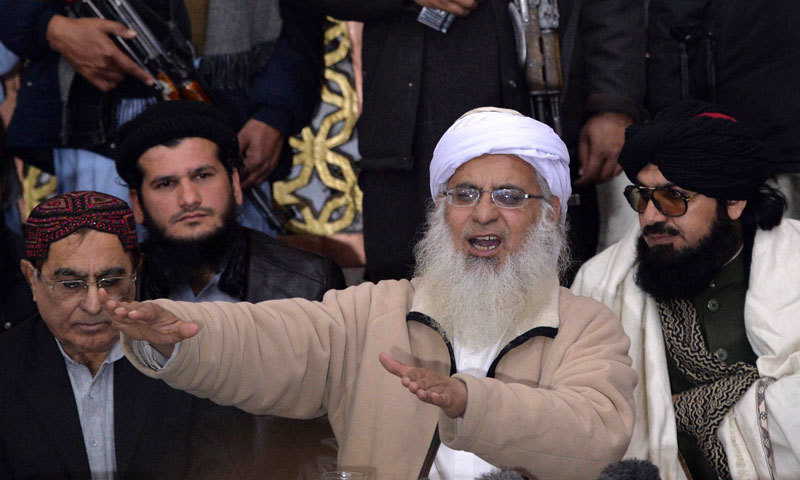In a significant movement a controversial figure from Islamabad’s Lal Masjid, Maulana Abdul Aziz Ghazi, was met with silence after he asked a question to the crowd. The Maulana asked his audience whether they would support Pakistan in a potential war against India.
This comes while he was speaking at Jamia Hafsa on May 2. During which Ghazi posed the question to a group of students and followers. However he was met with disappointment as he received no raised hands in favour or any response from the audience.
“Pakistan’s fight is a fight of nationality, not of Islam, and that there is more oppression in Pakistan than in India,” he says. “This means there is enough understanding,” Ghazi stated after the silence. He himself started interpreting the moment as a sign of growing awareness and disillusionment.
What did Ghazi say?
Ghazi said, “I have a question for you. Tell me, if Pakistan fights against India, how many of you would support Pakistan and fight for it?” (No hands are raised) “This means there is enough understanding,” he continued. Ghazi went further to criticise the Pakistani establishment, by stating, “Today, Pakistan has a system of disbelief a cruel, useless system. It is worse than India.”
Criticism of State Policies
The Ghazi went on to deliver a scathing critique of the Pakistani establishment. He stated that Pakistan’s system is one of “disbelief” and labeling it worse than India’s. The cleric further referenced military actions in Balochistan and Khyber Pakhtunkhwa. He accused the state of bombing its own citizens and committing atrocities.
“What happened in Balochistan, what they did in Pakistan and across Khyber Pakhtunkhwa these are atrocities. When the people were ready, the state bombed its own citizens”, Ghazi alleged. He drew attention to long-standing grievances from within these regions.
Pashtun Cleric Echoes Anger: ‘You Have Oppressed Us’
Well, this isn’t just the only video another viral video features a cleric from Khyber Pakhtunkhwa expressing similar outrage. In the video he addressed an audience, condemning the state’s treatment of Pashtuns. The cleric also questioned their loyalty to the Pakistani establishment.
“You have harmed Pashtuns so much – you think we will stand by you? You think we will chant “Zindabad” for you? Tell me – Am I right or wrong? You have oppressed our land.You have oppressed us Pashtuns,” Khyber Pakhtunkhwa Maulana is heard saying in a video.
“Which Pashtun child have you not left in tears? O’Lord have these soldiers’ children cry the way Pashtun children cried. Let them mourn in their homes now. In Swat and Malakand, every family is in mourning. Every family has lost two or three people. You think Pashtuns will support you?”
Army-Police Confrontation Reflects Growing Internal Tensions
In addition to the growing signs of internal unrest, a separate video from Lakki Marwat in Khyber Pakhtunkhwa shows a tense standoff between the Pakistan Army and local police. In the footage, police officers block a military convoy from entering a station. In the video one officer can be even seen pointing a weapon at army personnel.
“What are you doing here? Even if your General comes, we won’t allow you,” a police officer is heard saying. “This is Lakki Marwat Police. Remember that.”
Pahalgam Attack Sparks Diplomatic Crisis
The domestic upheaval between the two states follows the April 22 terror attack in Pahalgam. The attack that occurred in Jammu and Kashmir which killed 26 civilians.
The attack is being described as the deadliest such incident since the 2008 Mumbai attacks. Following the attack India retaliated by suspending parts of the Indus Waters Treaty. India further revoked visas for Pakistani nationals.
Meanwhile, as Islamabad braces for diplomatic fallout, U.S. Secretary of State Marco Rubio has urged Prime Minister Shehbaz Sharif. They condemn the attack and have asked to cooperate with investigations, placing additional pressure on Pakistan’s government.
Fractures Exposed in Civil-Military
Critics view these incidents from the silence at Lal Masjid to regional unrest. This reflects the signs of deepening fractures within Pakistan’s social, religious, and military spheres.
The region’s strongholds of pro-establishment sentiment, clerical voices are now publicly denouncing the state. This shift signals a widespread disillusionment not only with governance but with Pakistan’s ideological posture toward India.


